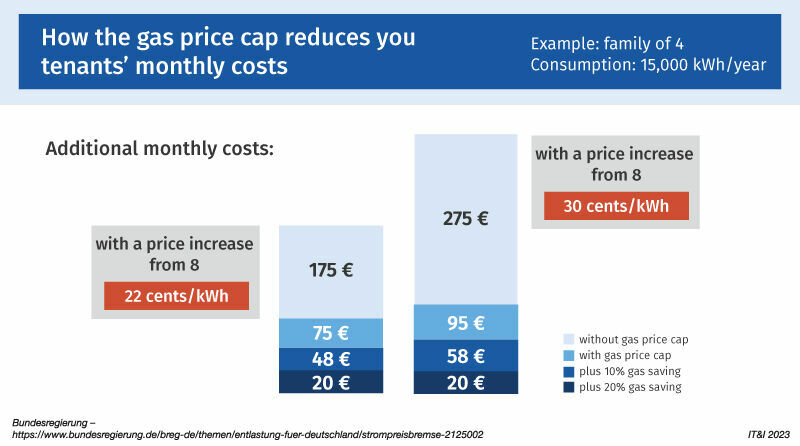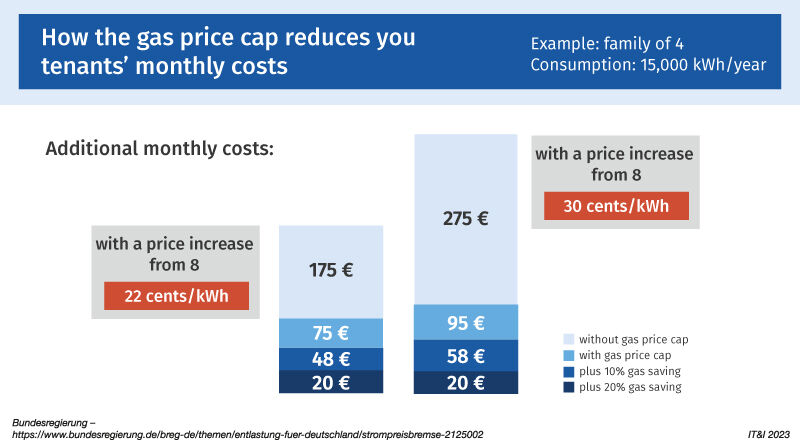Gas prices are rising and the gas price cap is intended to remedy the situation.

The gas price cap, as a component of this legislative package, applies to consumers as well as small and medium-sized enterprises from March 2023 and also retrospectively covers the months of January and February 2023. It caps the gas price at 12 cents per kilowatt hour for a certain basic quantity of gas, namely 80 per cent of the annual consumption which was forecast in September 2022 for 2023. For consumption above this basic quantity, however, the market price demanded by the respective supplier must continue to be paid. This is intended to provide relief on the one hand, while maintaining an incentive to save energy on the other. The gas price cap is thus not a general price regulation measure, but is only intended to protect consumers from disproportionate price increases.
In order to bridge the gap until the gas price cap comes into force, the federal government has also introduced the December discount for private households and small and medium-sized enterprises for the year 2022.
Industrial customers, on the other hand, will be subject to a different arrangement. Starting in January 2023, they will receive 70 percent of their 2021 natural gas consumption from their suppliers at a guaranteed 7 cents per kilowatt hour, but they will also have to pay the energy supplier’s regular market price for consumption in excess of this amount.
The gas and heating price caps are financed within the framework of the 200-billion-euro defensive shield against the energy crisis, although the federal government expressly wants these to be only temporary measures to protect consumers from the consequences of the global energy crisis. In the long term, the federal government is focusing instead on expanding renewable energies and promoting energy efficiency.
In this context, the gas price cap is not only a financial, but also a legal, and above all probably an organisational challenge – because it is not carried out and ultimately implemented by the state, but by the energy suppliers. The suppliers have to pass on the reductions to their gas customers and inform them in writing about the concrete effects, as well as adjust instalment payments to the changed price structure. And here it becomes apparent that some energy suppliers have not yet informed their customers, or have done so incorrectly, for example by applying too high instalment payments. This is quite understandable, as the suppliers are forced to make individual assessments of the previous year’s consumption, expected consumption and the costs to be applied for each individual customer, in order to then implement these in concrete terms for each individual customer.
Ultimately, all customers of the suppliers, whether tenants or landlords, will have to be advised to carefully check the suppliers’ bills in particular and, if necessary, to raise objections against incorrect calculations, and also to pay increased attention to the written notices from the gas suppliers and adjustments to the partial invoices.

Figure 1: This example shows how the gas price cap reduces the additional monthly costs of a family of four.
 Figure 1: This example shows how the gas price cap reduces the additional monthly costs of a family of four. |
Depending on the situation, the gas price cap has the following effects for the landlord.
- It is easiest for the landlord if tenants have concluded a contract directly with their gas supplier. In this case, billing is handled directly between the two parties without any involvement of the landlord.
- If, on the other hand, there is a supply contract between the landlord and the gas supplier, the landlord is obliged to pass on the relief included in the gas price cap to the tenants in the operating costs statement. This also applies to the December relief payment, as this too was only received by the landlord and not by the tenant.
The situation is similar for condominium owner associations. Here, too, the relief only applies directly to them, but they must pass it on to their respective owners as part of the settlement for the year 2023.
In conclusion, the gas price cap, just like the other measures in this package, certainly leads to relief for consumers, businesses and the industry. It should be noted, however, that in addition to the suppliers, landlords in particular are confronted with a considerable organisational and thus, ultimately, probably financial burden, at least in cases where they have to implement the specific measures with their tenants.
Author:

was born in 1967 in Munich. He studied law in Munich and, during his traineeship, worked in New York for six months for Germany’s largest record label. He has been a member of the bar since 1996 and founded his first law firm in 1999. He specialises in consulting in the field of computer and Internet law, including procedural enforcement of the relevant claims. His other areas of activity include trademark, copyright and competition law. Stephan Wiedorfer has been a certified specialist for industrial property rights since 4 February 2008. He is a member of the Deutsche Vereinigung für gewerblichen Rechtsschutz und Urheberrecht e. V. (GRUR; German Association for Industrial Property and Copyright), the Deutsche Gesellschaft für Recht und Informatik e. V. (DGRI; German Association for Law and Informatics)) and the Arbeitsgemeinschaft Informationstechnologie im Deutschen Anwaltverein (DAV-IT; Information Technology Working Group of the German Association of Lawyers).
Other articles by this author:
- Article "Compliance – what is actually still permitted today?"
- Article "Is the Internet of Things first and foremost an Internet of legal uncertainty?"
- Article "There was once a noticeboard... How to use social media channels in a legally compliant manner"
- Article "Digital butler or spyhole? What you need to consider when implementing a tenant app"
- Article "Contract design for software implementation – how significant are fairness and transparency?"
- Article "Everything is flowing smoothly – drafting contracts for agile projects"
- Article "WhatsApp in companies – how can it be used in a legally compliant way?"
- Article "What digital data rules are in place for asset and property management contracts?"
- Article "Smart, sure. But safe? Drones deployed for property management"
- Article "Are security vulnerabilities to hacker attacks a defect for which the software provider can be held liable?"
- Article "Gas prices are rising and the gas price cap is intended to remedy the situation."

